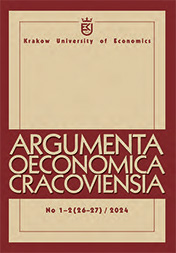Impact of Government Corruption and Economic Growth in Sub-Saharan Countries
DOI:
https://doi.org/10.15678/AOC.2024.2605Keywords:
sub-Saharan African countries, panel data, corruption, government effectivenessAbstract
Objective: This research aims to investigate the effectiveness of government in sustainable economic growth and its impact on the control of corruption in selected sub-Saharan African (SSA) countries between 2002 and 2017.
Research Design & Methods: In this study, the independent variables included in the model, Control of Corruption (CONC), Government Effectiveness (GEFF) and Rule of Law (RLAW), were investigated using panel data analysis to investigate their possible effects on the Annual GDP Growth Rate as the dependent variable. Data obtained from selected SSA countries were used in the model to analyse possible relationships between these variables in the specified period.
Findings: The findings show that controlling corruption is not statistically significant but negatively affects economic growth in SSA countries. Conversely, the rule of law is statistically significant and negatively impacts these countries.
Implications/Recommendations: The results highlighted the necessity of strengthening the institutional structures and controls to increase the positive effects of government effectiveness and corruption control on economic growth in SSA countries. Similarly, in line with the results obtained from this study, governments in the region are recommended to prioritise strengthening their institutional structures to promote economic development.
Contribution: This study draws attention to the critical role of a properly functioning legal system and the rule of law in SSA countries, as well as to economic growth, and contributes to the existing literature in this context. In addition, the detrimental effects of weak institutional structures on the relationship between the control of corruption and economic performance in the region are also highlighted. Ultimately, the research highlights the need for joint initiatives and efforts to address governance challenges and promote sustainable economic development in SSA countries.
References
Alam, M. R., Kiterage, E., & Bizuayehu, B. (2017). Government Effectiveness and Economic Growth. Economic Bulletin, 37(1), 222–227.
Awan, R. U., Akhtar, T., Rahim, S., Sher, F., & Cheema, A. R. (2018). Governance, Corruption and Economic Growth: A Panel Data Analysis of Selected SAARC Countries. Pakistan Economic and Social Review, 56(1), 1–20.
Bayar, Y. (2016). Public Governance and Economic Growth in the Transitional Economies of the European Union. Transylvanian Review of Administrative Sciences, 12(48), 5–18.
Brewer, G. A., Choi, Y., & Walker, R. M. (2007). Accountability, Corruption and Government Effectiveness in Asia: An Exploration of World Bank Governance Indicators. International Public Management Review, 8(2), 204–225.
CPI. (2017). Corruption Perceptions Index.
Haydaroğlu, C. (2016). Corruption, Institutions and Economic Growth in Sub-Saharan Africa. International Journal of Economics and Research, 7, 14–26.
Huang, C.-J. (2016). Is Corruption Bad for Economic Growth? Evidence from Asia-Pacific Countries. The North American Journal of Economics and Finance, 35, 247–256. https://doi.org/10.1016/j.najef.2015.10.013
Huntington, S. (1968). Political Order in Changing Societies. Yale University.
Ionescu, L. (2014). The Adverse Effects of Corruption on Growth and Development. Economics, Management and Financial Markets, 9(4), 125–130.
Ishola Mobolaji, H., & Omoteso, K. (2009). Corruption and Economic Growth in Some Selected Transitional Economies. Social Responsibility Journal, 5(1), 70–82. https://doi.org/10.1108/17471110910940014
Kaufmann, D., Kraay, A., & Mastruzzi, M. (2010). The Worldwide Governance Indicators: A Summary of Methodology, Data and Analytical Issues (World Bank Policy Research Working Paper No. 5430). The World Bank. Retrieved from: https://papers.ssrn.com/sol3/papers.cfm?abstract_id=1682130 (accessed: 10.05.2015).
Leff, N. (1964). Economic Development through Bureaucratic Corruption. American Behavioral Scientist, 8(3), 8–14. https://doi.org/10.1177/000276426400800303
Mauro, P. (1995). Corruption and Growth. Quarterly Journal of Economics, 110(3), 681–712. https://doi.org/10.2307/2946696
Montes, G. C., & Paschoal, P. C. (2016). Corruption: What Are the Effects on Government Effectiveness? Empirical Evidence Considering Developed and Developing Countries. Applied Economics Letters, 23(2), 146–150. https://doi.org/10.1080/13504851.2015.1058900
Nwankwo, O. F. (2014). Impact of Corruption on Economic Growth in Nigeria. Mediterranean Journal of Social Sciences, 5(6), 41–46. https://doi.org/10.5901/mjss.2014.v5n6p41
Omoteso, K., & Ishola Mobolaji, H. (2014). Corruption, Governance and Economic Growth in Sub-Saharan Africa: A Need for the Prioritisation of Reform Policies. Social Responsibility Journal, 10(2), 316–330. https://doi.org/10.1108/SRJ-06-2012-0067
Ovat, O. O., & Bassey, E. E. (2014). Corruption, Governance and Public Spending in Nigeria: Implications for Economic Growth. Journal of Economics, Management and Trade, 4(11), 1679–1699. https://doi.org/10.9734/BJEMT/2014/10531
Pacific, Y. K. T., Ramadhan, A. A., & Gabriella, N. M. A. (2017). Does Control of Corruption Accelerate Economic Growth in Botswana? Global Journal of Human-Social Science Research, 17(6).
Transparency International. (2018). Corruption Perceptions Index. Retrieved from: https://www.transparency.org/en/cpi/2018
United Nations. (2015). Investing in Development. A Practical Plan to Achieve the Millennium Development Goals. Millennium Project. Report to the UN Secretary-General. United Nations Development Programme.

